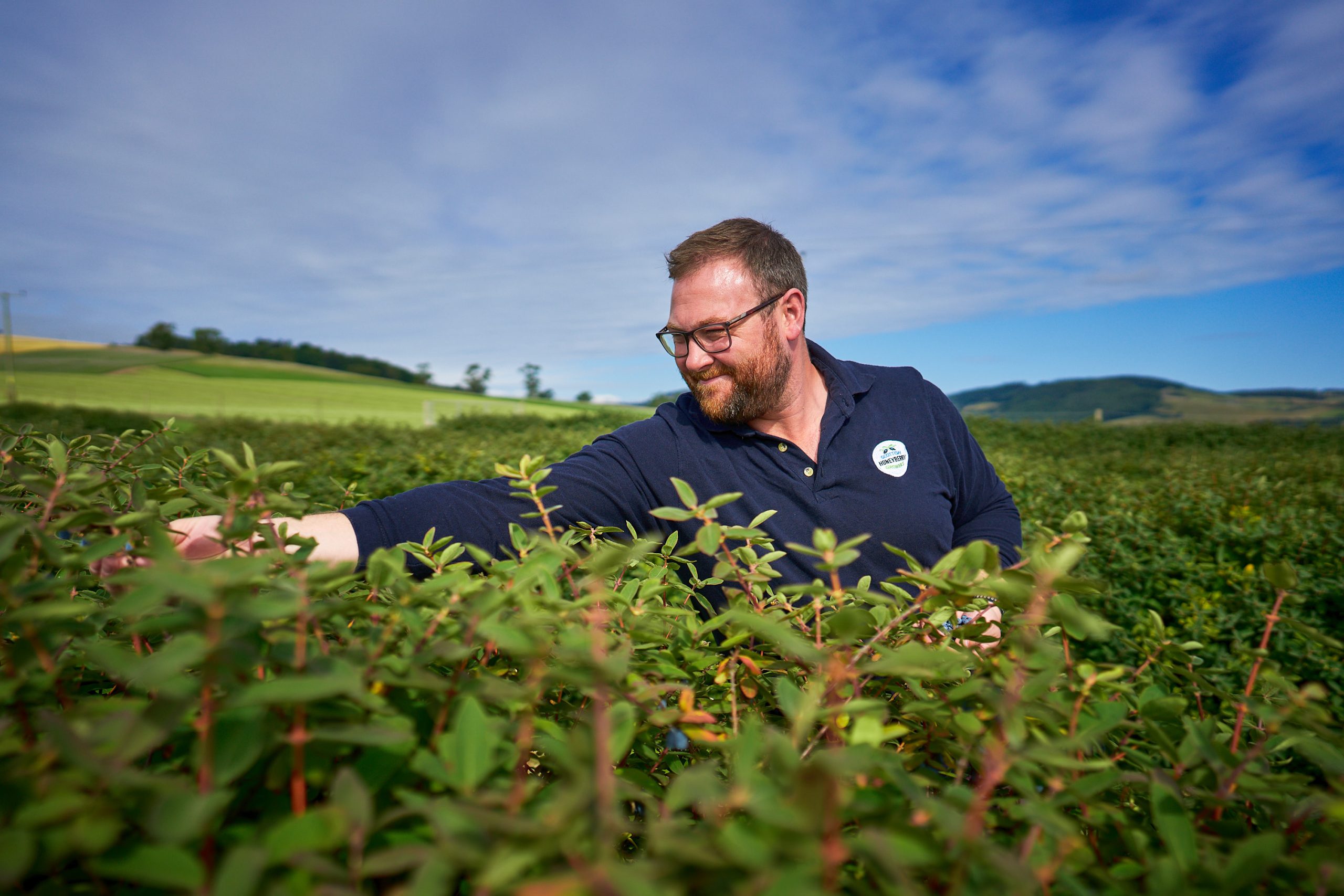Finn Hay, of Hay Farms in rural Perth, is one of the founding members of the Scottish Honeyberries co-operative and a champion for this exciting new superfood.
As a fifth-generation farmer – Hay Farms was established in 1892 at Easter Rhynd in Perth – Finn Hay knows a thing or two about tradition. Supplying oats to Quaker for porridge, wheat to Diago for spirit, and barley and rapeseed to multiple buyers, Hay Farms is an essential, if unseen, cog in the Scottish food and drink industry.
Whilst the vast majority of Hay’s arable crop is reserved for these time-honoured routes to market, an innovative opportunity presented itself in 2016 when he was approached to join a new soft fruit growing endeavour by Stuart Arbuckle, a successful berry farmer based in Angus.
Honeyberries – also known as a Haskap Berry – are native to Japan, Russia and Canada, thriving as they do in cooler, seasonal climates. Known as the berry of longevity, they are packed full of health benefits boasting four times the Vitamin C of blueberries and offering antioxidant, anti-inflammatory, neuro-protective, and cardio-protective properties.
Finn commented, “Stuart Arbuckle came across honeyberries on a trip abroad and had experimented with planting before approaching a handful of local farmers to gauge interest in launching a Scottish production group. His vision was to create a co-operative that would grow, sell, value-add and market this new Scottish product.”
Hay Farms become one of the first to join the nine-strong group, planting their first crop in 2017.
“The sales pitch is easy; the health benefits are right up there with other super berries placing it into the young, health-conscious market.
“But even with that, the biggest challenge has been educating the customers; although it tastes delicious but it’s not as sweet as a raspberry or strawberry which means it better lends itself as an ingredient. The flavour really packs a punch, and the dark purple flesh and skin brings beautiful colour to a plate.
“Once you get past the idea that it isn’t a traditional straight-from-punnet-summer-snack, it becomes hugely diverse. We were featured on Hairy Bikers earlier this year and they used it in a sauce with Scotch beef, and in a Cranachan, perfectly showcasing it as both savoury and sweet. And because it has more tannins than grapes and Perthshire based winery, Cairn O’mohr, produced a Honeyberry wine last year.”
The group has taken a two-pronged approach to sales. Frozen berries are sold into the trade as a raw ingredient, and it is becoming commonplace to find honeyberries featured on the menus of Scotland’s award-winning restaurants and on-trend bistros and bars. Alongside this, the co-operative has developed a growing product range that includes jam and freeze-dried berries in a snack pack to sell direct to consumer, and via wholesalers into UK farm shops and delis.
Finn continues, “Gleneagles Hotel now do honeyberry muffins at breakfast, and chefs such as Jamie Scott at The New Port and Stuart Black at 63 Tay Street, use them regularly on the menu. This has helped us enormously both in building recognition for the fruit itself, and in growing demand.
“Once people taste it, they love it. We go to trade shows and do tasting events with stockists, and people are enthused by what we’re offering – it’s a great product!
Supporting the Claims
To fully exploit the health claims and growing opportunity, the co-operative formed a Knowledge Transfer Partnership with the James Hutton Institute, the globally recognised research organisation delivering fundamental and applied science to drive the sustainable use of land and natural resources based in Invergowrie.
The 3-year project, which ran from 2018 to 2021, was led by scientist Louise Gamble, who sought to determine the antioxidant levels of Honeyberries in comparison to other berries. As well as looking at the end product, she also produced a growth guide to help other Scottish farmers who hope to join the group.
Growing The Investment
As a group, each farm committed to a six-figure capital investment which allowed Finn to plant across 5 acres of berries. As is the way with agriculture, this didn’t come to fruition until year three when he harvested 30 grams per bush of honeyberries. By year five this had grown to 900 grams per bush – and as group of eight, they now harvest 40 tonnes of honeyberries annually. This is predicted to increase to around 70 tonnes annually over the next 3 years.
To realise the full potential of their investment, the group has employed a sales manager to take them to the next stage.
“The scale up has been fast, but due to the nature of the berry, around 70% of the crop is frozen which gives us a year-round opportunity to sell. The next step for the co-operative is attracting large scale customers who want serious tonnage; we have a guaranteed supply and need a guaranteed volume order. Manufacturers of jam or purees would be ideal but we’re also talking to a gin distiller to offer a new flavour of Scottish botanical.”
“Alongside this, we want to develop additional products for our own direct to consumer brand. We’ve been experimenting with chocolate and yoghurt coating for the freeze-dried pouches, and we’re currently working on a soft drink / mixer that should be ready to launch at the end of the year in time for the Christmas market.”
“We’re now making inroads across the wholesale and industry markets and the potential to snowball is there. There’s no reason why we can’t make a success of this.”

